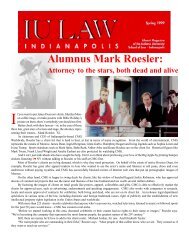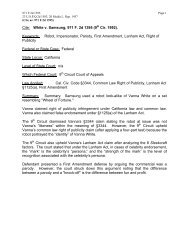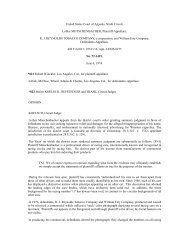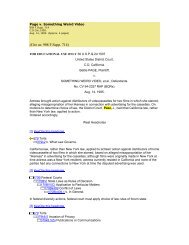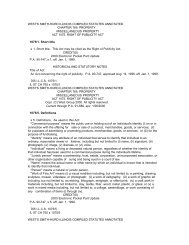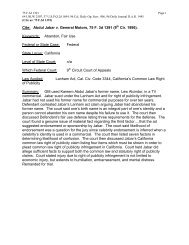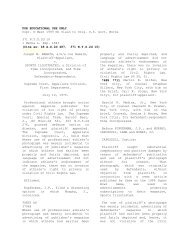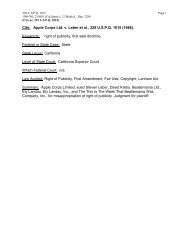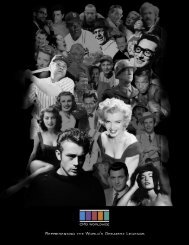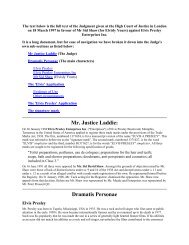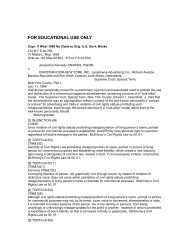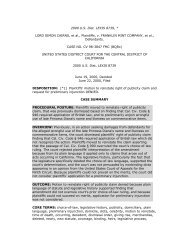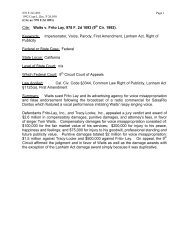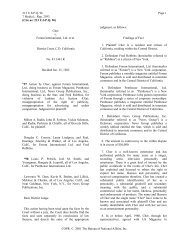Hustler v. Falwell.pdf - Mark Roesler
Hustler v. Falwell.pdf - Mark Roesler
Hustler v. Falwell.pdf - Mark Roesler
You also want an ePaper? Increase the reach of your titles
YUMPU automatically turns print PDFs into web optimized ePapers that Google loves.
malignant." Leidholdt, 860 F.2d at 894; Ault, 860 F.2d at 881. Numerous cases<br />
establish that speech may not be suppressed simply because it is offensive.<br />
E.g., <strong>Falwell</strong>, 485 U.S. 46, 108 S. Ct. 876, 99 L. Ed. 2d 41 ; Erznoznik v. City<br />
of Jacksonville, 422 U.S. 205, 21 1-12, 45 L. Ed. 2d 125, 95 S. Ct. 2268 & n. 6<br />
(1975) (absent captive audience, speech may not be regulated simply because it<br />
is offensive); Cohen, 403 U.S. at 16 ("Fuck the Draft" is protected); Hess v.<br />
Indiana, 414 U.S. 105, 107, 38 L. Ed. 2d 303, 94 S. Ct. 326 (1973) (per curiam)<br />
("We'll take the fucking street later," or "We'll take the fucking street again"<br />
is protected); see Brandenburg v. Ohio, 395 U.S. 444, 23 L. Ed. 2d 430, 89 S.<br />
Ct. 1827 (1969) (per curiam) (racist advocacy by Ku Klux Klan); Collin v.<br />
Smith,<br />
578 F.2d 1197 (7th Cir.) (Nazi march in Jewish community), cert. denied, 439<br />
U.S. 916, 58 L. Ed. 2d 264, 99 S. Ct. 291 (1978). [**32] Instead, a large<br />
body of case law sharply limits the reach of these categories by requiring that<br />
the speech be directed toward and likely to incite imminent unlawful action.<br />
See, e.g., Hess, 414 U.S. at 108; Brandenburg, 395 U.S. at 447. Appellants<br />
introduced no material evidence that <strong>Hustler</strong> is likely to cause imminent<br />
unlawful action n8 or, perhaps even more importantly, [*1200] that <strong>Hustler</strong><br />
is directed to producing or inciting such action. Accordingly, we reject this<br />
argument, as well.<br />
- - - - - - - - - - - - - - - - - -Footnotes- - - - - - - - - - - - - - - - - -<br />
n8 As we have noted above, a heated public debate currently rages about<br />
pornography. Some partisans in that debate contend that pornographic<br />
publications such as <strong>Hustler</strong> are likely to cause imminent unlawful action. Other<br />
partisans claim, with equal vigor, that pornographic publications do no such<br />
thing. At best, the scientific evidence concerning the causal relationship<br />
between pornographic materials and violent actions is ambiguous and<br />
unvalidated.<br />
Such equivocal evidence is insufficient to establish the "clear and present<br />
danger" required in order for any of the exceptions to general first amendment<br />
principles to apply.<br />
- - - - - - - - - - - - - - - - -End Footnotes- - - - - - - - - - - - - - - - -<br />
V<br />
As described by appellants, their civil its claims assert that "the<br />
[**33] persistent attacks on Andrea Dworkin and other feminist<br />
anti-pornography leaders, such as Gloria Steinem, intimidated [appellants] and<br />
chilled their exercise of their own free speech rights. The crux of these claims<br />
was that these women were afraid to exercise their rights to speak out against<br />
pornography because if they did so they risked such vile and cruel portrayals of<br />
themselves as were levied against Andrea Dworkin and Gloria Steinem." In<br />
effect,<br />
appellants argue that <strong>Hustler</strong> and Flynt are subject to first amendment<br />
constraints in the same manner and to the same extent that state actors are.<br />
Appellants' argument in support of this claim is virtually incoherent. It<br />
consists of little more than the unsupported assertion that a private actor<br />
violates the first amendment if he utters unprotected speech that has an adverse<br />
effect on the expressive activity of another. Nevertheless, we consider their<br />
argument as best we can.



